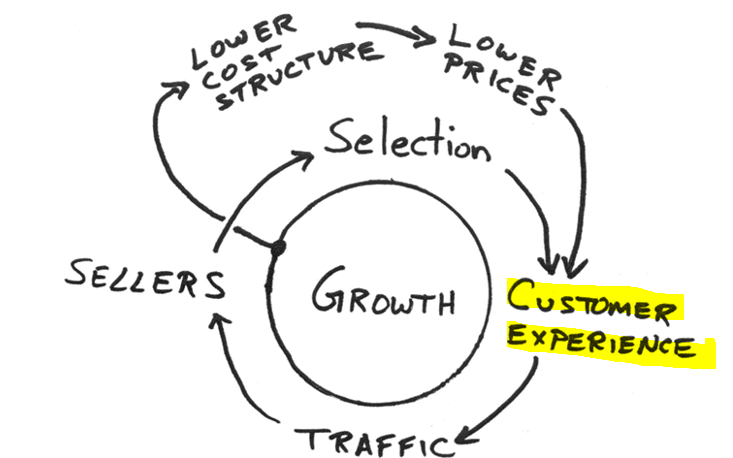AWS is my favourite Cloud platform
In 2018 my team was developing an IoT platform and needed to pick a Cloud vendor. We considered GCP, AWS, Azure, Eurotech, and more. At that time, AWS was the clear winner, mostly because of cost. Other differentiators included technology, the level of granularity of various AWS services, and optimizations. There is a broader key strategy to consider.
AWS Cost Strategy
AWS is the only Cloud Service Provider that bases its business model on the Jevons Paradox. It is a very intelligent decision I approve, and it takes guts. Normally, vendors adjust prices to maximize sales and profit. But AWS chose to lower prices to enable Companies to do more. This way, considering the actual value delivered, the total demand actually increases as Companies can do more and more in the Cloud.
AWS has a name for this concept, the Amazon Flywheel:

Other Companies merely sold a service: customers could own a cheaper private data center or pay for the advantages of the Cloud. This is perfectly understandable. AWS on the other hand made it a win-win: with a correct provisioning and utilization, the Cloud always costs less. AWS still made money leveraging scale economy. Private data centers have become obsolete. The Amazon Flywheel started a change in the world. It is thanks to AWS that the future is in the public Cloud.
In 2019 I participated to an AWS Summit hosted in Italy. During keynote speeches, AWS presented customer success stories: Companies who had cut their costs by migrating, for example, from EC2 instances to ECS. Not only AWS itself constantly seeks to reduce costs by releasing cheaper alternatives and optimizing processes, but encourages and supports customers to find their own cost optimization strategies: it’s a key pillar of the AWS Well-Architected framework. Amazon Flywheel shows that, in the big picture, this actually increases their total income as well. I love this vision.
Other Cloud providers have aligned
Sure, other vendors, during these years, had to align somewhat to AWS rates, rather than overcharging for the single item. But the Flywheel remains unique and netly different. This was still valid in 2021 when my team at DevGraph released CloudFix, a software that enables savings for up to 20% of cloud bills with just a few clicks and almost no risk. Any vendor would normally consider this a damage, but these fixes are endorsed by AWS. They consider them as healthy operations. To reiterate, thanks to this, AWS makes less money. Instead to complain about this loss, AWS thinks customers will use the saved money to use more of the cloud and, thanks to it, accomplish more, and in turn, use even more. Do you see the genial idea?
There are exceptions. For example AWS charges more for egress data. AWs is not for free. You have to pay attention and optimize. However, at the end of the month I typically see lower bills on AWS than elsewhere, this is my ballpark statement now.
AWS improvement over the last years
Let’s also consider that in 2018 AWS documentation was, in all fairness, terrible. It cost my team effort to figure most issues ourselves. Today the situation is totally opposite: there is an abundance of documentation, blog posts, and examples for almost every service. Likewise in 2018 I encountered a loss of update when editing Lambdas, but this has now completely disappeared. This trend towards reliability is especially important, because I haven’t observed similar efforts in other vendors. There’s even an AWS Community Builder program with very prolific content creators that have proven as game changers for AWS in the competitor landscape.
AWS is the true inventor of the Cloud
AWS, itself, is a team of innovators. Microsoft, pre 2000, as part of project Palladium, theorized the Cloud for the first time. However it was AWS who made it happen, the true category designer and king of the Cloud. If you ask me, I really like doing business with AWS. I think their business model accelerates progress internally and for customers. AWS has automatic processes for innovation, which ensures you can expect continuous updates, new services, and best in class technology.
In Conclusion
My current team also uses GCP, VMWare, IBM Cloud, and Azure, but we are migrating everything to AWS. As part of a very large organization it’s inevitable you will have to consider many options and take the best from every vendor, for example GCP is necessary for Google Maps, which is a category king itself, and also I think Firebase is pretty cool. But overall, when in doubt, just go with AWS and you will be right at least 90% of the time.
